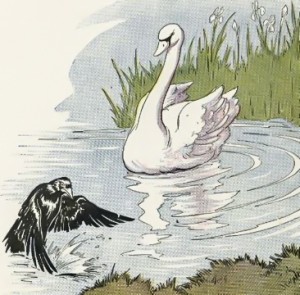A Raven desired a Swan’s white feathers. He thought the color was due to the water so he went to live in the lake. Not water, and going hungry, he perished.
Change of habit cannot alter nature.
A Raven saw a Swan and strongly desired the Swan’s beautiful white feathers. Thinking the color was due to constant washing in the water the Swan was swimming in, the Raven left his perch and went to live in the lake. But washing in the lake’s water had no effect on the Raven’s color and as he could not fish for food, he perished.

Aesop For Children
A Raven, which you know is black as coal, was envious of the Swan, because her feathers were as white as the purest snow. The foolish bird got the idea that if he lived like the Swan, swimming and diving all day long and eating the weeds and plants that grow in the water, his feathers would turn white like the Swan’s.
So he left his home in the woods and fields and flew down to live on the lakes and in the marshes. But though he washed and washed all day long, almost drowning himself at it, his feathers remained as black as ever. And as the water weeds he ate did not agree with him, he got thinner and thinner, and at last he died.
Moral
A change of habits will not alter nature.

Townsend version
A Raven saw a Swan and desired to secure for himself the same beautiful plumage. Supposing that the Swan’s splendid white color arose from his washing in the water in which he swam, the Raven left the altars in the neighborhood where he picked up his living, and took up residence in the lakes and pools. But cleansing his feathers as often as he would, he could not change their color, while through want of food he perished.
Moral
Change of habit cannot alter Nature.

L’Estrange version
A raven had a great mind to be as white as a swan, and fancy’d to himself that the swan’s beauty proceeded in a high degree, from his often washing and dyet. The raven upon this quitted his former course of life and food, and betook himself to the lakes and the rivers: but as the water did him no good at all for his complexion, so the experiment cost him his life too for want of sustenance.
Moral
Natural inclinations may be moulded and wrought upon by good councell and discipline; but there are certain specifick properties and impressions, that are never to be alter’d or defac’d.

Cygnus et Corvus
Cum cygnum vidisset corvus, aemulari colorem voluit. Sed arbitratus e lavacris eum provenire, relictis aris unde nutriebatur, ad lacus et flumina vitam egit. Et cum lavaret quidem corpus, non mutavit; pastu vero destitutus, mortuus est.
Moral
Naturam non potest transmutare vivendi genus.
Perry #398
